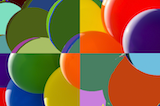Events
2013
07
Jan
Organisers:
Gregor Miller (General Chair)
Daesik Jang and Kenji Mase (Programme Chairs)
Daesik Jang and Kenji Mase (Programme Chairs)
Venue:
Winter Vision Meetings (WVM2013)
Tampa, Florida, U.S.A., 15th-17th January 2013
Tampa, Florida, U.S.A., 15th-17th January 2013
Website:
OpenVL proudly sponsors the 1st Workshop on User-Centred Computer Vision (UCCV'13), to be held as part of the IEEE Winter Vision Meetings in Tampa, Florida, U.S.A. in January 2013. UCCV is a one day workshop intended to provide a forum to discuss the creation of intuitive, interactive and accessible computer vision technologies.
The majority of researchers in computer vision focus on advancing the state-of-the-art in algorithms and methods; there is very little focus on how the state-of-the-art can be usefully presented to the majority of people. Research is required to provide new technology to address the shortcomings in the usability of computer vision.
The workshop will bring together researchers from academia and industry in the fields of computer vision and human-computer interaction to discuss the state-of-the-art in HCI for Vision. We invite the submission of original, high quality research papers on user-centred, interactive or accessible computer vision. Areas of interest include (but not limited to):
The majority of researchers in computer vision focus on advancing the state-of-the-art in algorithms and methods; there is very little focus on how the state-of-the-art can be usefully presented to the majority of people. Research is required to provide new technology to address the shortcomings in the usability of computer vision.
The workshop will bring together researchers from academia and industry in the fields of computer vision and human-computer interaction to discuss the state-of-the-art in HCI for Vision. We invite the submission of original, high quality research papers on user-centred, interactive or accessible computer vision. Areas of interest include (but not limited to):
- Vision systems/frameworks designed for use by non-experts
- Visual or Integrated Development Environments for vision system design
- High-level abstractions of vision algorithms
- Algorithm/Task/User level API design
- Detection/tracking/recognition of a physical person as input to an interactive system
- Interpretation of user input such as descriptions, sketches, images or video
- Automatic or interactive algorithm selection
- Automatic or interactive task selection
- Automatic or interactive parameter tuning for vision algorithms
- Using compute vision to exploit meaningful user interaction
- Case studies on user-centred computer vision
- Interactive/supervised correction of weaknesses in the current state-of-the-art in computer vision
- Evaluation of vision interfaces (e.g. through user studies)









